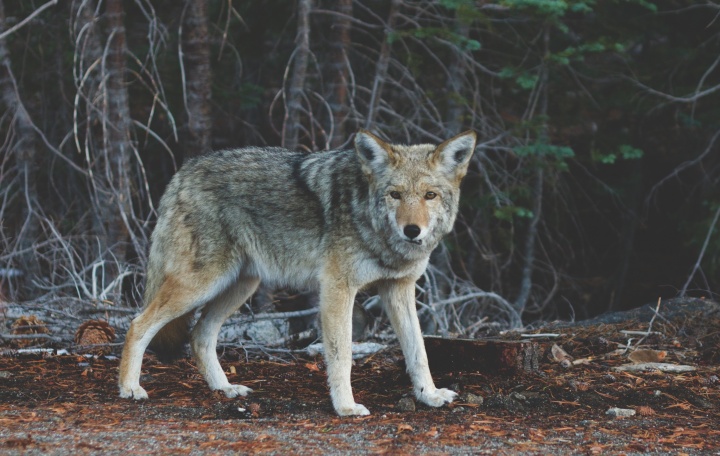Beware of Wolves!

I live in Gravette, Arkansas, about 20 miles from where we meet for church services in Cave Springs. So much of what I spend time thinking about relates to "goings on" in my local community. I subscribe to the Westside Eagle Observer, a newspaper serving western Benton County, to keep up with area news and activities. I learn about what is going on in the local schools and how local communities are fairing in community activities and public works. I also have access, as one would expect, to editorial topics ranging anywhere from recipes to religion.
A recent edition had in it a short article, "Are there wolves in Arkansas?" written by Randy Moll, managing editor of the publication, and he used it to remind us of another article he posted back in February of 2012 about wolf sightings in Arkansas. Were there sightings of real, wild wolves, or just mixed breeds or escaped domesticates? The latter is what the Arkansas Game and Fish Commission believed and advised. Mr. Moll included with this short reminder also an article out of Cape Girardeau, Missouri, which revealed a downed canine to be a true gray wolf from the wild. Cape Girardeau, located in southeastern Missouri, is only about 60 miles north of the Arkansas border.
I have a good friend at church who is certain she has seen a wolf crossing the highway near her home, and she lives about five miles away from me! Do we have anything to fear from these creatures if found in the wild? Well, It's always wise to avoid contact with wild predators, but most people would agree that legend does not live up to reality. In the U.S. there have been three reported human casualties from wolf attacks since 1942, according Wikipedia, and fewer than 8,000 worldwide known reports since A.D. 1400, or, on average, 13 every year, worldwide. Notably, almost 3,300 of those reports came from France alone, a highly disproportionate record to that reported in other nations.
So if wolves aren't as treacherous a creature to humans as legend would have it, why would the apostle Paul write: "Pay careful attention to yourselves and to all the flock, in which the Holy Spirit has made you overseers, to care for the church of God, which he obtained with his own blood. I know that after my departure fierce wolves will come in among you, not sparing the flock; and from among your own selves will arise men speaking twisted things, to draw away the disciples after them" (Acts 20:28-30)? He claims wolves to be grievous, fierce, or savage, depending on the translation.
Well, just for the sake of anecdotal comparison, in a blog post published at opg.org, 199 cattle and 249 sheep were reported killed by wolves in the Northern Rockies of the United States in 2012 ("Gray Wolves: By the Numbers"). If the Northern Rockies would have been running sheep and cattle since A.D. 1400, over 122,000 cattle and sheep might have been attacked and killed by wolves in that time period. In 2012, wolves in the Northern Rockies killed no people.
Looking carefully at Acts 20:29, we find that Paul is drawing an analogy where members of the Church of God are likened to sheep, not humans. The warning, then, appears quite substantial when we review the damage wolves can cause to a flock of sheep or herd of cattle. But what does it mean? Who is Paul equating with wolves?
In His own words, Jesus Christ helps make this clear:
“Beware of false prophets, who come to you in sheep's clothing but inwardly are ravenous wolves. You will recognize them by their fruits. Are grapes gathered from thornbushes, or figs from thistles?" (Matthew 7:15).
There will be people who look and act like us in many ways, appearing to be sheep, but they will bring with them false religion, making it possible to deceive followers of Christ, leading them away from the truth. These men and women, like wolves, can divide flocks and take down the weak. As in nature where sheep and cattle should be always wary of the presence of wolves, we, too, should be always watchful, looking to the Good Shepherd for protection (John 10:10-14).
So should we concern ourselves with nightmares about wolves attacking humans? I don't believe so, because I believe it is a baseless fear. But spiritually speaking, as sheep in God's flock, we should always be wary of false teachers who are likened to wolves in the Scriptures. In some of Jesus' final hours before being crucified, He prayed to the Father on our behalf, "Sanctify them in the truth; your word is truth" (John 17:17). The word Jesus referenced was none other than the written Word of God, so to be able to look to our Good Shepherd, we must gauge all teaching against the true Word of God. If it is taught in sync with God's Word, then your teachers are, themselves, sheep like you, and members of the flock.
Read your Bible and let the power of God's Word always protect your spiritual journey so that no wolf can bring you down.

